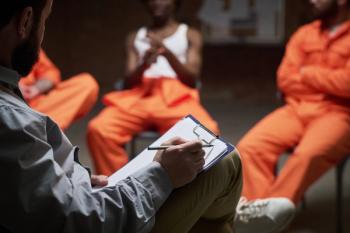
- Psychiatric Times Vol 36, Issue 5
- Volume 36
- Issue 5
The Grief Monster
She wondered what the secret was to life as a psychiatrist, a grieving daughter, and a new mother of twins.
PORTRAIT OF A PSYCHIATRIST
–Series Chair, H. Steven Moffic, MD
Dr Giacobone is a general adult psychiatrist and a psychotherapist specializing in CBT. She was a Lecturer in Psychiatry at the University College Dublin, Republic of Ireland, and currently works in clinical psychiatry in Dublin.
My husband can hear me sob inconsolably as I muffle my screams into my pillow. It is so soaked in tears and sweat that I have no choice but to raise my burning eyes and, invariably, stare at the framed picture of my mother standing on my bedside table. I have been baptized by “the grief monster.” With empty desperation, I drown in a sea of darkness. I am 30 years old-an only child. I gave birth to twin girls 2 months ago, and I lost my mother a month later. I wondered what the golden secret was to new motherhood as a grieving daughter.
On the evening of Friday, January 5, I rang the obstetrician’s office to confirm my test results. The secretary took what felt like an eternity to read the hormone levels, and yes, I was effectively pregnant. Less than 2 weeks later, I was leaving my new post in psychiatry, my husband, my pets, and my life in Ireland to hop on a plane to Buenos Aires. “We saw something in your mother’s colon in the ultrasound,” the doctor had said on the phone, “and the liver seems highly compromised, too.” I can still hear the words resounding in my head, like a dagger piercing all my senses. It was denial that got me through the 14-hour flight-the feeble conviction that they had found an abscess that explained the fever, and maybe the liver had abscesses too, or benign cysts. It was, in fact, stage IV colon cancer with liver metastases, and although I never told anyone (not even my mother), her chance of survival was only 10%.
An emotional ride
The surgeon summoned me. His voice was grave. At that point, I was certain that my mum had died in surgery. “We couldn’t remove the tumor,” he explained nonchalantly. He then began to get excited, as if reciting a novel case in an international surgical conference, “The size of the tumor was massive, and the smallest metastasis is the size of lemon.” I don’t exactly remember falling, only the jolt of my aunt’s arms supporting my back as I hit a nearby column. “This lady will be killed by the lymph nodes in the peritoneum though,” the surgeon continued, directing his gaze to my uncle, as if he was the most interested participant of his case exposition. “At least we managed to bypass the bowels to avoid obstruction.”
Being empathic comes with overwhelming emotions. I still fear now that the twins will absorb my sadness during the days I can barely breathe, or that they will be confused by my sudden mood swings given my denial and shock. Reading, talking, and consulting with my obstetrician and even my former boss helped me navigate these uncertain waters. I began to question if it would be right for me to jump straight back into work after my mother’s passing. I wondered, “What if having a gap in my CV will affect my career?” “What if being around the babies with such heavy emotions will make them neurotic and unhappy?” So began a vicious cycle of worry and sadness, until my very wise, very understanding and experienced former boss, who also happens to be a perinatal psychiatrist, said, “You should not go back to work any time soon. You are not galivanting around and traveling the world. For now, having twins and losing your mother are your full-time duties.” It will take months to recover, maybe longer-but that is okay.
Reality hits
“Will she meet the baby?” was one of my aunt’s first questions after the surgeon had so bluntly given us the news of the failed operation. “I don’t think so,” I blabbered, as a nurse announced my mother was ready to be visited in the intensive care unit (ICU). She might have been ready, but I surely was not. I crouched on her bed and held on tightly to her still limp body, waterfalls of tears flooding her hospital gown. Within minutes, she asked, “Will I die, love?” I looked into her beautiful, infinite, almond eyes, and I blurted out, “Yes.” She didn’t cry. She only caressed and kissed my hair, promising everything would be okay. Always the carer, always prioritizing my wellbeing and inspiring me even as we entered the confines of Hell. Always my mother.
I slept on the floor of the ICU for two nights, I distinctly recall holding my tummy the second night, murmuring to what I was sure was my growing baby boy. “Felix,” I whispered, “It’s okay if you want to go. Mommy will understand. It is the worst time for you to come to this world sweetheart, and if you want to leave, I won’t blame you.” How wrong I was, not only because I was expecting the most unexpected twin girls, but because it was the
Conflicts of the self
Grief has the effect of shaking core beliefs and certainly provokes a whirlwind of emotions. That was certainly the case with me, but it is the loneliness and guilt that scared me the most. The on-call doctor asked me if I wanted an anxyolitic. As a psychiatrist, all my reasoning fought against it. I considered the adverse effects of benzodiazepines to the babies, their half-life, effectiveness, and interactions. But my instincts stopped me, and for the first time, I put myself before everything else and accepted the prescription. Not only that, but I requested a referral to a perinatal psychiatrist, who came to see me right before we were discharged after the twins’ birth.
Even with all our theoretical knowledge and clinical experience, when loss touches us, we discover that we, too, are human. I try to remind myself that I play
I still remember the dread I felt as I entered her hospital room, heart pounding madly in my chest, fearing I would collapse from sadness. I felt a sense of pride, tinged with a pinch of guilt, naturally, when I finished closing the suitcases and caressing the walls goodbye. The linens on my mother’s bed were flooded by tears-but I did it. I survived, all on my own. It was the proper goodbye-the slap in the face that I needed to be shaken out of shock and denial to progress into deep sadness and acceptance now. And acceptance may lead to letting go one day.4
The dream of resilience
One morning, as I changed one of my twin’s nappies, she stared at me as if wondering why I was the one crying desperately and not she. Grief almost knocked me to the floor. It is not only pain that defines my grief, for that emotion can be easy to override. It is the explosive mixture of despair and emptiness that is much more striking. It is not the even the presence of the images of my mother’s last days that torture me, with her almost unrecognizable face and her delirious thoughts; rather it is the absence of the memories that we will never make. I will never hear her soft voice again, see her dancing ridiculously to 80s music, watch her basking for hours on end under the sun, or admire her endlessly in all her flaws and imperfections.
My mother dazzled with the strength of her light and grace; she was elegant as she was sharp and proud as she was generous. Not even her departure managed to break a love so infinite, so strong, so eternal. I relish now in the hungry yelps of my babies, in the tiny sighs they make when they are bursting with milk, in the unconscious smirks they draw on their perfect faces when they’re dreaming. It is in the sparkle of one of the twin’s curious eyes that I find my mother’s vivacity, in the other’s cleverness I tease out my mother’s. I feel my mother’s empathy in my husband’s embrace. They are the epitome of love, desire, passion, and life that one day will expel the grief.
My story could be anyone’s story-and it is a story of lessons.5 I openly share this fragment of my life with my fellow psychiatrists. From mourning comes resilience; from loss, we can rethink our place in the world, and ultimately, a light can be shed on the end of one thing and the beginning of another. Even now, with a seemingly forever missing compass, I find the courage to disclose my raw grief and see that strength can be mustered even in the darkest of times. Motivation will continue to feed my existence and strengthen my profession, but above all, love and time will lighten my way-as it will yours.
This article was originally published on March 6, 2019 and has since been updated.
Disclosures:
The author reports no conflicts of interest concerning the subject matter of this article.
References:
1. National Institute for Health and Care Excellence. Antenatal and postnatal mental health: clinical management and service guidance (NICE Clinical Guidelines, No. 192.).
2. Foelsch PA, Odom A, Arena H, et al.
3. Karatzias T, Hyland P, Bradley A, et al.
4. Hayes SC. Get Out of your Mind and Into Your Life. Oakland, CA: New Harbinger; 2005.
5. Frankl V. Man’s Search for Meaning: An Introduction to Logotherapy. New York: Simon & Schuster; 1984.
Articles in this issue
over 6 years ago
Introduction: Meeting Our Personal and Professional Goalsover 6 years ago
Locum Psychiatric Practice: Unexpected, Unheralded Benefitsover 6 years ago
The Role of Social Media in Private Practiceover 6 years ago
Disability: Overview of Concepts Psychiatrists Need to Knowover 6 years ago
Introduction to Immunotherapy of Malignancies for Psychiatristsover 6 years ago
Looking for AmericaNewsletter
Receive trusted psychiatric news, expert analysis, and clinical insights — subscribe today to support your practice and your patients.







